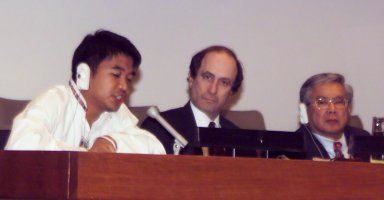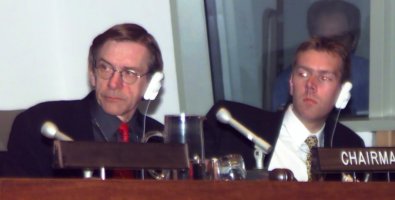| |

Photo (left to
right) : Wilfredo Alangui (Philippines); Barry Herman
FfD Secretariat; Asda Jayanama (Thailand).
|
centre: Barry Herman, Chief,
International Economics Relations Branch (UN/DESA) gave a
background of the Financing for Development (FfD)
Preparatory Committee (prepcom) and its Bureau. Set up within UN/DESA,
the FfD prepcom and its Bureau were mandated to organize
consultations in preparation for a high-level intergovernmental
Ministerial meetings regarding finance for development at 2001's
GA.
|
above right: Ambassador Asda
Jayanama
Permanent Mission of Thailand to the UN
"In July 997 when the financial crisis hit Asia, the typical
western view was that it was caused by crony-ism, widespread
corruption, the lack of good governance, poor management and
operating inefficiencies – which may or may not have been true
– but 6 months later it became clear that the crisis was due to
something more fundamental involving the international financial
system. The crisis was part of globalization." Jayanama also
gave the book a positive review, saying that it was concise,
accurate, very-focused on the international financial system, and
written from a developing country perspective.
|
above left: Wilfredo
Alangui
TEBTEBBA Foundation (Philippines), and
the
World Council of Churches
Alangui shared sentiments for the search for new
financial architectures, citing that current imbalances lead to
issues of security, the erosion of social fabric, leading to
increased levels of crime, violence and unrest, inside and outside
the home. Recommendations echo Martin Khor's prescriptive plan for
developing countries to retain their own domestic policies, to slow
down and claw back financial liberalization in developing countries,
and scrutinize multi-lateral financial agreements. The international
financial system thus needs to properly address issues of economic
vulnerability in developing countries and, in doing so, should
search for the solution within systemic dysfunctionality.
|
|
|
left: Kamal Malhotra,
Sr. Civil
Society Advisor (UNDP).
During the '97 economic crisis,
the need for responsible financial architecture reform was clearly
articulated, but that initial hope has faded, and efforts to date
have been superficial. Malhotra outlined key elements of a
responsible architecture hark back to basic principles: that
economic and financial policies must be a means to sustainable
development, rather than an end in themselves; financial capital
flows should support the real economy of goods and services,
rather than take on a life of their own; the financial
architecture should increase the national autonomy of individual
states rather than constrain them; and multi-partite participation
is necessary and should make room for the role of the UN system.
With this in mind, Malhotra's proposals include ensuring
financial pluralism and hence more competition for the
international financial institutions; scaling back the
responsibilities of the IMF to its original mandates, while
entrusting them to scrutinize all countries on equal footing; and
strengthening and enhancing ECOSOC to incorporate financial
considerations.
|
|
Erik Blytt
Halvorson
Co-Editor : "Global Financial Challenges
: Towards a Responsible Financial Architecture for the Developing
Countries"
The UN has a potential to reform financial
systems in the economic respect, but hasn't been able to fulfill
these potentials because of eclipsing by the Bretton Woods system
(i.e. IMF, IBRD). Perhaps the Financing for Development process will
make this possible. In any case, its more important to get a process
underway than necessarily agreeing on a system in advance.
|

Photo
(left to right) : Panel Chair Jan Gustav Strandenaes,
Managing Director, Norwegian Forum for Environment and
Development; Erik Blytt Halvorsen.
|
 |
Sustainable Development Learning Center
Conference Room A: During the CSD-8, this room houses computers
with internet access, websites, computer software and printed materials
relevant to the events at CSD-8.
|

 ENB
Summary of Ad Hoc Open-Ended Intergovernmental Group of Experts on Energy
and Sustainable Development ENB
Summary of Ad Hoc Open-Ended Intergovernmental Group of Experts on Energy
and Sustainable Development
 CSD-8
Intersessionals CSD-8
Intersessionals
 Linkages
CSD page Linkages
CSD page
 UN
- CSD website with official
documents UN
- CSD website with official
documents
 ENB's
"Introduction to CSD" ENB's
"Introduction to CSD"

|